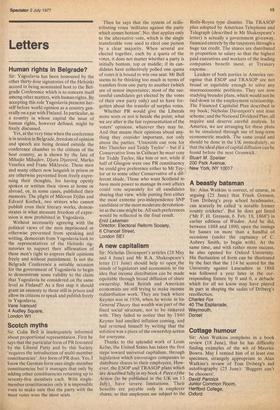Scotch myths
Sir: Colin Bell is inadequately informed about proportional representation. First he says that the particular form of PR favoured by the Liberal Party and by this Society 'requires the introduction of multi-member constituencies'. Any form of PR does. Yes, I know the German form uses single-member constituencies but it manages that only by adding other constituencies returning up to seventy-five members each. With single- member constituencies only it is impossible even to make sure that the party with the most votes wins the most seats.
Then he says that the system of redis- tributing votes 'militates against the party which comes bottom'. No: that applies only to the alternative vote, which is the single transferable vote used to elect one person by a clear majority. When several are elected together, each by a quota of the votes, it does not matter whether a party is initially bottom, top or middle; if its can- didates have collectively polled one quota of votes it is bound to win one seat. Mr Bell seems to be thinking too much in terms of transfers from one party to another (which are of minor importance; most of the suc- cessful candidates get elected by the votes of their own party only) and to have for- gotten about the transfer of surplus votes.
Whether PR would give the Liberals more seats or not is beside the point; what we are after is the fair representation of the voters' opinions, whatever they may be. And that means their opinions about any- thing they consider important, not only about the parties. 'Unionists can vote for Mrs Thatcher and Teddy Taylor' — but if a Conservative lives in Cathcart he must vote for Teddy Taylor, like him or not, while if half of Glasgow were one PR constituency he could give preference either to Mr Tay- lor or to some other Conservative of a dif- ferent shade. Those who want Scotland to have more power to manage its own affairs could vote separately for all candidates sharing that view, while putting first either the most extreme pro-independence SNP candidate of the most moderate devolution- ist as the case might be. All such preferences would be reflected in the final result.
Enid Lakeman Director, Electoral Reform Society, 6 Chancel Street, London SE1


































 Previous page
Previous page